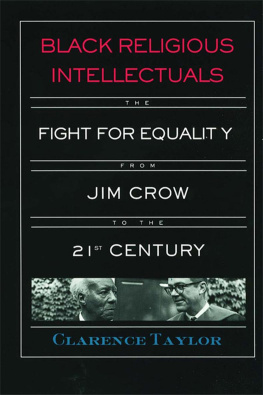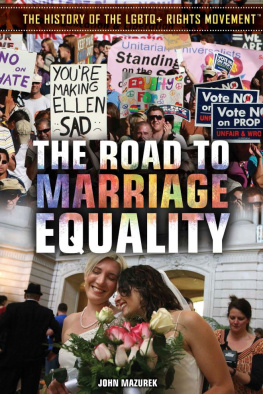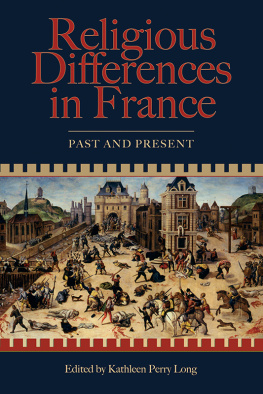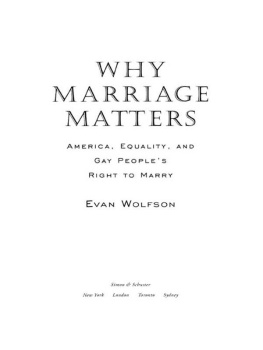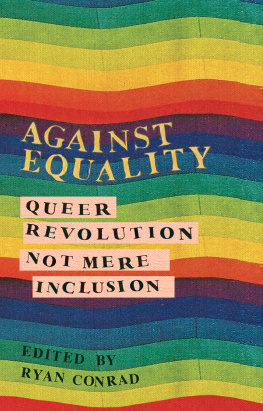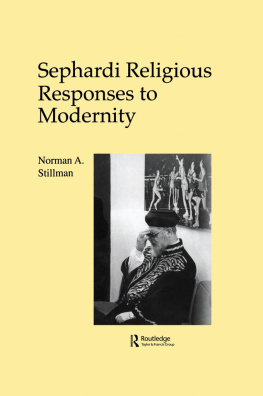Social change can be a confounding topic to study in meaningful and comprehensive ways. Perrys work makes excellent use of detailed case studies to show how sections of society interact with changing social norms. The religious responses show as much about the evolving nature of American politics as they do the individual traditions.
Christopher Cronin, Associate Professor of Political Science, Methodist University
Religious Responses to Marriage Equality
The Supreme Court ruling in Obergefell v. Hodges (2015) ended a 20-year political battle over same-sex marriage in the USA. The ruling in favor of a constitutional right for gays and lesbians to marry reflected growing social acceptance and political rights for gays and lesbians. At the same time, America remains a deeply religious country and many religious organizations have long opposed same-sex marriage. How do religious organizations interpret, process, and respond to shifting attitudes and public policy toward the LGBT community?
Examining how religious groups in America have responded theologically and politically to the legalization of same-sex marriage, the book provides case studies from across the American religious spectrum to explore how each group understands same-sex marriage and has reacted theologically, socially, and politically to its new standing as a constitutional right. Each case study focuses on formal statements made by church leaders, incorporates original data gathered from interviews with regional and local religious authorities, and analyzes existing polling data of adherents at large.
Offering a comprehensive examination of religious responses to marriage equality in the USA, this book will interest scholars and students in the fields of religion and politics, civil rights, social change, and public policy.
Luke Perry is professor and chair of the Department of Government and Politics at Utica College, and director of The Utica College Center of Public Affairs and Election Research. Perry was a graduate fellow at the University of Massachusetts where he earned an M.A. and Ph.D. in Political Science with expertise in American politics and comparative politics. A Fulbright Scholar, Perry has lectured at universities throughout Europe and worked with various organizations, including the Washington Center, Junior Statesmen of America, the Kellogg Foundation, and the U.S. Peace Corps. Perrys current research focuses on U.S. elections, the presidency, and religion and politics.
Routledge Studies in Religion and Politics
Edited by Jeffrey Haynes,
London Metropolitan University, UK
This series aims to publish high quality works on the topic of the resurgence of political forms of religion in both national and international contexts. This trend has been especially noticeable in the post-cold war era (that is, since the late 1980s). It has affected all the world religions (including, Buddhism, Christianity, Hinduism, Islam, and Judaism) in various parts of the world (such as, the Americas, Europe, the Middle East and North Africa, South and Southeast Asia, and sub-Saharan Africa).
The series welcomes books that use a variety of approaches to the subject, drawing on scholarship from political science, international relations, security studies, and contemporary history.
Books in the series explore these religions, regions, and topics both within and beyond the conventional domain of church-state relations to include the impact of religion on politics, conflict and development, including the late Samuel Huntingtons controversial yet influential thesis about clashing civilisations.
In sum, the overall purpose of the book series is to provide a comprehensive survey of what is currently happening in relation to the interaction of religion and politics, both domestically and internationally, in relation to a variety of issues.
The Religious Problem with Religious Freedom in North America
Perspectives on Political Theology
Robert Joustra
An Introduction to Religion and Politics (2nd edition)
Theory and Practice
Jonathan Fox
Religious Responses to Marriage Equality
Luke Perry
The Politics of New Atheism
Stuart McAnulla, Steven Kettell and Marcus Schulzke
For more information about this series, please visit: www.routledge.com/Routledge-Studies-in-Religion-and-Politics/book-series/RSRP
First published 2018
by Routledge
2 Park Square, Milton Park, Abingdon, Oxon OX14 4RN
and by Routledge
711 Third Avenue, New York, NY 10017
Routledge is an imprint of the Taylor & Francis Group, an informa business
2018 Luke Perry
The right of Luke Perry to be identified as author of this work has been asserted by him in accordance with sections 77 and 78 of the Copyright, Designs and Patents Act 1988.
All rights reserved. No part of this book may be reprinted or reproduced or utilised in any form or by any electronic, mechanical, or other means, now known or hereafter invented, including photocopying and recording, or in any information storage or retrieval system, without permission in writing from the publishers.
Trademark notice: Product or corporate names may be trademarks or registered trademarks, and are used only for identification and explanation without intent to infringe.
British Library Cataloguing-in-Publication Data
A catalogue record for this book is available from the British Library
Library of Congress Cataloging-in-Publication Data
Names: Perry, Luke (Professor), author.
Title: Religious responses to marriage equality / Luke Perry.
Description: 1 [edition]. | New York : Routledge, 2018. | Series: Routledge studies in religion and politics | Includes bibliographical references and index.
Identifiers: LCCN 2017059696 | ISBN 9781138633612 (hardback) | ISBN 9781315207247 (e-book)
Subjects: LCSH: Same-sex marriageReligious aspectsChristianity. | Same-sex marriageReligious aspects. | ChristianityUnited States. | United StatesReligion.
Classification: LCC BT707.6 .P47 2018 | DDC 306.84/80973dc23
LC record available at https://lccn.loc.gov/2017059696
ISBN: 978-1-138-63361-2 (hbk)
ISBN: 978-1-315-20724-7 (ebk)
Typeset in Times New Roman
by Apex CoVantage, LLC
Introduction
The issue of marriage equality may have been legally resolved by the Supreme Court in 2015 after 50 years of related contestation at the local, state, and federal levels of government. The court ruled in Obergefell v. Hodges that gay and lesbian couples throughout the United States have a constitutional right to marry. Political differences that fueled these debates, however, did not suddenly disappear, and that should not have been expected. Religious objections, based on theological and moral claims, do not typically change quickly.
This book examines how religious groups have responded to the legal reality of marriage equality. The book focuses on three questions. First, and most fundamentally, how did religious organizations respond? What statements and actions occurred in the two years since the Obergefell ruling? Religious factors are among the strongest predictors of public opinion toward same-sex relationships.1 The religiously devout, and particularly theological conservatives or fundamentalists, tend to most strongly oppose homosexuality. At the same time, America has strong rule of law whereby most Americans follow the law most of the time, a particular priority for political conservatives. Such obedience involves a high amount of trust and respect for law, democratic institutions, and the judiciary. The U.S. Constitution, in particular, is the supreme law of the land, intimately connecting constitutional rights with national norms that shape culture and society. The newly established constitutional right for gay and lesbian couples to marry will undoubtedly influence social perceptions, including those who are religious. 2015 was a pivotal movement and the starting point for scholars to understand the socio-legal implications of marriage equality on a national scale.




